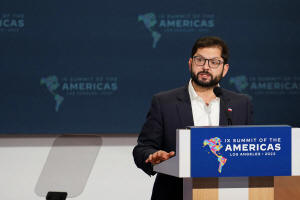Chile's new leftist president gets reality check as support wanes
 Send a link to a friend
Send a link to a friend
 [June 29, 2022]
By Alexander Villegas [June 29, 2022]
By Alexander Villegas
SANTIAGO (Reuters) - The optimism engulfing
Chile's leftist President Gabriel Boric as he took power in March has
dimmed as inflation, social unrest and political missteps dent his
popularity and fuel doubts about a push to steer the economy away from
market-friendly policies.
The former student protest leader handily won a presidential election in
December, rattling business, particularly the mining sector, with his
proposals to change tax laws to fund social spending and toughen
environmental regulation. Chile is the world's top producer of copper
and No. 2 producer of lithium.
An opinion poll on Monday showed Boric's support plunging to 34%, the
lowest level of his presidency, closely mirroring waning backing for the
country's planned new constitution.
"It's been three months of a lot of intensity, big lessons,
self-criticism and learning to work as a team," Camila Vallejo, a
communist in Boric's Cabinet who serves as the official spokesperson for
his administration, told Reuters.

"The first difficult moment we had was our first week," she added,
mentioning how the interior minister's visit to the restive Araucania
region had been interrupted by gunfire.
How Boric fares is key for Chile and a barometer for leftist governments
in the region and their ability to win over voters angry with high gas
and food prices, cooling economic growth and the residual impact of the
coronavirus pandemic.
Inflation in Chile is currently running at an 11.5% annual rate, far
above the central bank's target range of 2% to 4%. Monthly inflation
rose to almost a 30-year high in March.
Boric marks a break from the Andean country's traditionally strait-laced
leaders and remains a beacon for those citizens fed up with inequality
in one of the region's wealthiest nations after violent protests in
2019.
He pledged during the 2021 election campaign to "bury" the country's
market-led economic model, though tempered his aims when he installed a
market-friendly finance minister.
DEEP CHANGES
But while Boric's environmental agenda and focus on inclusivity - women
make up a majority of his Cabinet - have earned him plaudits, analysts
said most voters were more focused on everyday matters.
[to top of second column]
|

Chile's President Gabriel Boric speaks during the Leaders' Second
Plenary Session during the Ninth Summit of the Americas in Los
Angeles, California, U.S., June 10, 2022. REUTERS/Lauren Justice

"People want to make it to the end of the month, be
able to buy a car, be certain their kids will prosper," said
Cristobal Bellolio, a political analyst and professor at the
University of Adolfo Ibanez in Santiago, the country's capital.
Unrest between indigenous groups and authorities in southern Chile,
where trucks have been burned and a train derailed, has also tested
Boric. And in late March, about two weeks after the new president
was sworn in, thousands of students demonstrated in Santiago to
demand higher food stipends. One student was shot during the
protest.
"Once you're in power, you realize that the carrot isn't enough,"
added Bellolio. "Once the party was over and things went back to
normal, it was logical that the themes of public safety were going
to be a headache for the government."
Giorgio Jackson, a minister and Boric confidant, told Reuters
earlier in June that raising the minimum wage had been one of the
government's biggest victories so far, and the next big push was tax
reform, including for the mining sector.
Chile also faces a key referendum in September on a new constitution
to replace the existing market-centric one that dates back decades
to the neo-liberal economic policies under military dictator Augusto
Pinochet.
While that process predates Boric, it underpins many of the ideas he
is trying to push on social rights and the environment.
Vallejo said the government was focused on holding a fair and
transparent plebiscite and would push its agenda regardless of the
outcome, though she added that the current constitution limits the
administration's proposed reforms.
"We'll push with the same conviction we had when we took power,"
Vallejo said. "Chile worked hard on this and we'd like to help show
the world we can make deep changes."
(Reporting by Alexander Villegas; Additional reporting by Natalia
Ramos; Editing by Paul Simao)
[© 2022 Thomson Reuters. All rights
reserved.]
This material may not be published,
broadcast, rewritten or redistributed.
Thompson Reuters is solely responsible for this content.
 |